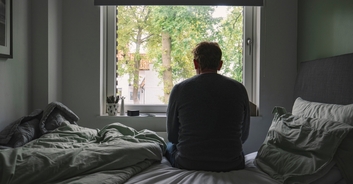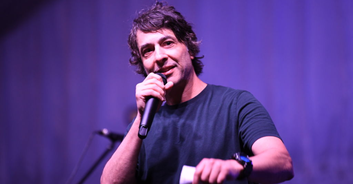A man who set the world record for sleep deprivation suffered catastrophic consequences.
We all know sleep is vital for our bodies and minds, but there have been some extraordinary cases where people have stayed awake for surprisingly long periods.
One of these cases occurred in 1963 after 17-year-old Randy Gardner and his friend Bruce McAllister came up with an idea for a science fair project, according to the BBC.
After putting their heads together, the teens decided they wanted to beat the world record for staying awake which at the time, was held by a DJ in Honolulu, who managed 260 hours, or just under 11 days.

The schoolboys wanted to test how the brain would react when it is fully sleep-deprived.
"[The] first version of it was [to explore] the effect of sleeplessness on paranormal ability," McAllister told the BBC in 2018. "We realized there was no way we could do that and so we decided on the effect of sleep deprivation on cognitive abilities, performance on the basketball court. Whatever we could come up with."
Luckily for McAllister, a coin toss meant that Gardner was the one to undertake the hazardous challenge of staying awake for as long as humanly possible. However, he was given the task of staying awake to monitor his friend, but after three sleepless nights, he "woke up tipped against the wall writing notes on the wall itself".
Realizing it was harder than it looked, the duo quickly enlisted the help of a friend named Joe Marciano, and soon after sleep researcher William Dement from Stanford University came on board.
In 1964, Dement - who is now an emeritus professor - was just starting his research in sleep science and had read about the experiment in a San Diego newspaper and immediately wanted to get involved.
"I was probably the only person on the planet at the time who had actually done sleep research," Dement said. "[Randy’s parents] were very worried that this might be something that would really be harmful to him. Because the question was still unresolved on whether or not if you go without sleep long enough you will die."
The first couple of days were a breeze for Gardner as he avoided beds and tried to stand up as much as he could. But by day three, the effects started to set in as the teen felt sick, his sense of smell was distorted, and he soon began hallucinating.
Speaking to NPR in 2017, he shared: "I mean, it was crazy, where you couldn't remember things, it was almost like an early Alzheimer's thing brought on by lack of sleep."
Shockingly, the teenager preserved and managed to stay awake for 11 days (264 hours), breaking the record at the time and marking an end to the insane science experiment.
But it was a project he would come to regret for the rest of his life, as McAllister told the publication: "We were idiots, you know young idiots."

As a result of the experiment, Gardner experienced moodiness, short-term memory loss, and concentration issues, as well as paranoia and hallucinations, as reported by the Daily Mail.
In addition to this, brain scans also found that his brain had been "catnapping the entire time...parts of it would be asleep parts of it would be awake".
Years later, several people tried to break Gardner’s record but the Guinness Book of Records stopped certifying attempts, stating that it could be harmful to people's health.


.jpg_klhOkr?tr=h-40&config=JTdCJTIybmFtZSUyMiUzQSUyMm51cnNpbmclMjBob21lJTIwKDEpLmpwZyUyMiUyQyUyMmRlc2NyaXB0aW9uJTIyJTNBJTIyRmVhdHVyZWQlMjBpbWFnZSUyMGNyZWRpdCUzQSUyME1BU1RFUiUyMCUyRiUyMEdldHR5JTIyJTJDJTIyYWx0ZXJuYXRpdmVfdGV4dCUyMiUzQSUyMm51cnNpbmclMjBob21lJTIwKDEpLmpwZyUyMiUyQyUyMmNhcHRpb24lMjIlM0ElMjJGZWF0dXJlZCUyMGltYWdlJTIwY3JlZGl0JTNBJTIwTUFTVEVSJTIwJTJGJTIwR2V0dHklMjIlMkMlMjJjb29yZGluYXRlcyUyMiUzQSU3QiUyMmRlc2t0b3AlMjIlM0ElN0IlMjJsZWZ0JTIyJTNBMCUyQyUyMnRvcCUyMiUzQTAlMkMlMjJyaWdodCUyMiUzQTElMkMlMjJib3R0b20lMjIlM0EwLjUyJTdEJTJDJTIydGFibGV0JTIyJTNBJTdCJTIybGVmdCUyMiUzQW51bGwlMkMlMjJ0b3AlMjIlM0FudWxsJTJDJTIycmlnaHQlMjIlM0FudWxsJTJDJTIyYm90dG9tJTIyJTNBbnVsbCU3RCUyQyUyMm1vYmlsZSUyMiUzQSU3QiUyMmxlZnQlMjIlM0FudWxsJTJDJTIydG9wJTIyJTNBbnVsbCUyQyUyMnJpZ2h0JTIyJTNBbnVsbCUyQyUyMmJvdHRvbSUyMiUzQW51bGwlN0QlN0QlMkMlMjJ3aWR0aCUyMiUzQTE1MzUlMkMlMjJoZWlnaHQlMjIlM0E4MDAlMkMlMjJ1dWlkJTIyJTNBJTIyOGFkN2ZlYjMtYzNiMC00YzI2LTkzMTgtY2ZmYzBhY2IwNTYxX193cC1jb250ZW50JTJGdXBsb2FkcyUyRm51cnNpbmdob21lKDEpLmpwZ19rbGhPa3IlMjIlN0Q=)





.jpg_klhOkr?tr=h-184&config=JTdCJTIybmFtZSUyMiUzQSUyMm51cnNpbmclMjBob21lJTIwKDEpLmpwZyUyMiUyQyUyMmRlc2NyaXB0aW9uJTIyJTNBJTIyRmVhdHVyZWQlMjBpbWFnZSUyMGNyZWRpdCUzQSUyME1BU1RFUiUyMCUyRiUyMEdldHR5JTIyJTJDJTIyYWx0ZXJuYXRpdmVfdGV4dCUyMiUzQSUyMm51cnNpbmclMjBob21lJTIwKDEpLmpwZyUyMiUyQyUyMmNhcHRpb24lMjIlM0ElMjJGZWF0dXJlZCUyMGltYWdlJTIwY3JlZGl0JTNBJTIwTUFTVEVSJTIwJTJGJTIwR2V0dHklMjIlMkMlMjJjb29yZGluYXRlcyUyMiUzQSU3QiUyMmRlc2t0b3AlMjIlM0ElN0IlMjJsZWZ0JTIyJTNBMCUyQyUyMnRvcCUyMiUzQTAlMkMlMjJyaWdodCUyMiUzQTElMkMlMjJib3R0b20lMjIlM0EwLjUyJTdEJTJDJTIydGFibGV0JTIyJTNBJTdCJTIybGVmdCUyMiUzQW51bGwlMkMlMjJ0b3AlMjIlM0FudWxsJTJDJTIycmlnaHQlMjIlM0FudWxsJTJDJTIyYm90dG9tJTIyJTNBbnVsbCU3RCUyQyUyMm1vYmlsZSUyMiUzQSU3QiUyMmxlZnQlMjIlM0FudWxsJTJDJTIydG9wJTIyJTNBbnVsbCUyQyUyMnJpZ2h0JTIyJTNBbnVsbCUyQyUyMmJvdHRvbSUyMiUzQW51bGwlN0QlN0QlMkMlMjJ3aWR0aCUyMiUzQTE1MzUlMkMlMjJoZWlnaHQlMjIlM0E4MDAlMkMlMjJ1dWlkJTIyJTNBJTIyOGFkN2ZlYjMtYzNiMC00YzI2LTkzMTgtY2ZmYzBhY2IwNTYxX193cC1jb250ZW50JTJGdXBsb2FkcyUyRm51cnNpbmdob21lKDEpLmpwZ19rbGhPa3IlMjIlN0Q=)



